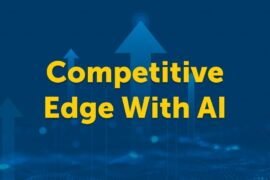Data analytics, coupled with the power of AI is transforming healthcare by leveraging data to improve patient outcomes, reduce costs, and make smart decisions. By analyzing vast amounts of data, such as patient records, medical histories and diagnoses, doctors and hospitals can provide personalized treatment for their patients. AI-driven data analytics also reduces costs and improves efficiency.
Data analytics can be used to predict which treatments are most effective for a particular patient based on medical history, age, gender and lifestyle. By using data analysis tools, healthcare professionals can make better-informed decisions about diagnosis and treatment plans.
In this article, we will discuss the impacts of AI and data analytics in healthcare, with examples of how it can be used to improve patient care. We’ll also explore how data analytics is being used in various areas of healthcare today.
Table of contents
What is data analytics in healthcare?
Data analytics in healthcare is the process of collecting and analyzing healthcare data to gain insights into patient care, costs and outcomes. It enables healthcare providers to make more informed decisions about patient care based on evidence, as well as provide more personalized treatments. Data analytics in healthcare can also be used to identify trends in patient data that can help inform public health initiatives, such as disease prevention and outbreak response strategies.
To understand how data analytics works, it’s helpful to look at use cases. For example, data analytics can be used to identify disparities in patient outcomes based on socio-economic factors or geographic location. It can also be used to analyze clinical trial results and predict outcomes of clinical trials before they are completed. Additionally, data analysis can uncover patterns in patient behavior that could lead to new treatment strategies.
Listen to our FuseBytes podcast episode on digitizing healthcare in Nepal.
Impacts of data analytics in healthcare
Improves patient care with data-assisted decisions
Medical professionals can identify patterns from a vast amount of data, which can help predict disease, drug interactions and other medical issues. This data can be used to create targeted treatment plans and provide personalized medicine. For example, AI-assisted algorithms can be used to identify signs of disease much earlier than traditional methods, leading to quicker diagnosis and more accurate prognosis.
Data analytics also helps doctors better understand patient behavior and preferences. By analyzing past records and feedback from the patient, health professionals are able to provide a more tailored treatment plan that yields better outcomes.
Lastly, data analysis helps health organizations manage resources effectively. By understanding trends within a population or region they are able to anticipate future needs allowing them to optimize payment models and plan for potential organizational changes.
Early diagnosis with historical data
Historical data can serve a highly important purpose in the healthcare field: early diagnosis. By utilizing past patient information, healthcare analysts can scan through large volumes of data to identify trends and patterns that indicate a particular issue. Early diagnosis has significant medical benefits, such as avoiding chronic illnesses and potentially life-saving results.
For example, a study found that historical patient data enabled a team to develop models which accurately predicted if an individual is likely to develop diabetic retinopathy. Using this information, healthcare professionals are better equipped with resources for earlier preventative treatment.
Thanks to data analytics, physicians who may not have access to all necessary patient data can make more informed decisions about treatments and diagnosis. Historical data serves as an aggregate reference point for healthcare professionals, providing a deeper understanding of certain diseases. By leveraging this valuable resource, healthcare professionals can provide patients with faster and more accurate treatments with fewer visits required for follow-up monitoring and care.
Better EHR maintenance
Healthcare organizations can use data analytics to better maintain the electronic health records (EHR) of their patients. With the use of data analysis, healthcare professionals can easily and quickly access patient records, which include a patient’s medical history and other vital information.
Data analytics also help healthcare systems identify trends in patient health. For example, if a number of patients in a particular geographic region are diagnosed with a particular type of illness or condition more often than elsewhere, the data analysis would reveal this trend. This could help medical professionals develop new treatment methods or even preventative measures for similar future cases.
Data analytics can also be used to observe the effectiveness of treatments for different illnesses, pinpoint areas for improvement in existing procedures, and gain insights into potentially successful new treatments. Access to such valuable information on the performance of medical treatments and procedures allows healthcare providers to make informed decisions on how best to care for their patients’ needs.
Data-backed training healthcare professionals
Healthcare organizations are using data analytics to provide specialized training to medical staff. This allows staff members to understand the specific needs of their patients, as well as develop skills related to their particular area of expertise. By leveraging data-driven insights, health care organizations are able to quickly identify areas of improvement and make strategic changes in order to deliver better patient experiences.
Data analytics helps healthcare professionals get up to speed quickly and stay current on the latest developments in the medical field. That’s why data-driven training is so important in healthcare. It can also help healthcare professionals identify trends and gain insights into how certain treatments are impacting patients with similar conditions. For example, analyzing data from digital tools provides doctors with real-time information on how particular treatments are being used, providing them with immediate feedback on efficacy and effectiveness.
Removes human bias for better outcomes
Data analytics affords healthcare practitioners, administrators and policy makers a new way to make decisions related to clinical outcomes and treatments. By relying on data-driven decisions, healthcare is no longer restricted by human bias.
For example, data analytics can provide insight into patient populations most in need of assistance with chronic issues such as diabetes and hypertension. By understanding which populations require more intensive, preventive care, or even just regular check-ins with their provider, better outcomes are more likely.
In addition, data analytics can be used to identify how different treatments affect various patient groups over time. This can be valuable information in assisting healthcare providers in making decisions about which treatments will be most successful.
Data analytics in population health management
When it comes to population health management, data analytics can provide insights into the healthcare needs of a community and make sure resources are distributed accordingly. With the right data analytics tool in place, healthcare providers can better identify areas where healthcare services are needed most, as well as assess how existing programs are addressing population health issues.
For example, an organization may use data analytics to identify vulnerable populations in their community who are at risk for chronic conditions such as obesity and diabetes. With this insight, they can create targeted programs that provide education on nutrition and physical activity as well as access to preventive services such as vaccinations. Data analytics can also be used to track outcomes and measure the effectiveness of these programs.
As more healthcare organizations embrace the power of data analytics, they will be able to make more informed decisions about their care delivery models and focus resources on areas where there is the greatest need.
Power your healthcare enterprise with AI solutions from Fusemachines. Click here to schedule a free consultation with our experts now.
To learn more about Fusemachines, click here.
Challenges of data analytics in healthcare
Data analytics in healthcare face certain challenges that need to be addressed to ensure successful implementation.
Lack of standards
The lack of unified frameworks and standards have delayed the adoption of data analytics tools in healthcare. This has been a significant obstacle to integration and sharing of data amongst organizations.
Compliance requirements
Compliance with security and privacy regulations is critical when it comes to collecting patient data. Healthcare organizations must adhere to HIPAA, GDPR, and other compliance frameworks to ensure data security otherwise risking fines and penalties.
Data integrity
Compromised data is of limited use to businesses, much alone the risks posed by sensitive data loss. As a result, maintaining data integrity is a primary priority of many enterprise security systems. Poor-quality data can also cloud the validity of insights generated from analytics tools.
Adaptability issues
Data tools may not be able to securely access multiple sources due to lack of compatibility with different systems, affecting their scalability and ability to reach large audiences. Organizations must be cautious when incorporating new solutions into existing systems.
Leveraging AI for better insights into your healthcare data
AI is ushering in a transformative era in healthcare by significantly improving insights derived from healthcare data. With its ability to process massive volumes of patient information rapidly and uncover intricate patterns, AI empowers healthcare professionals to extract deeper, more meaningful insights.
These insights go beyond what traditional methods can achieve, enabling more precise diagnoses, personalized treatment plans, and even predictive analytics for disease prevention. By harnessing the power of AI, healthcare providers can unlock invaluable insights from patient records, medical histories, and diagnostic data, ultimately enhancing patient care, optimizing resource allocation, and driving better clinical outcomes.
Artificial Intelligence (AI) empowers data analytics by augmenting its capabilities in numerous ways. AI algorithms excel at processing vast amounts of data quickly and extracting valuable insights, allowing data analytics to operate at unprecedented scales and speeds. Machine learning, a subset of AI, enhances predictive analytics by identifying hidden patterns and making data-driven forecasts with remarkable accuracy.
Furthermore, AI-driven natural language processing (NLP) can analyze unstructured data sources like medical literature or patient notes, unlocking previously untapped sources of information. Moreover, AI enhances data analytics by automating routine tasks, freeing up data scientists to focus on more complex analyses and innovative solutions.
Use cases and examples of data analytics in healthcare
Data analytics, or the process of analyzing raw data to uncover trends and correlations, is improving the efficiency and efficacy of healthcare systems. By using data to identify patterns, health professionals are able to provide better care and improved outcomes. Here are some of the ways data analytics is being used in healthcare:
Identifying high-risk patients
Data analytics can be used to identify high-risk patients in a given population—those who may be more likely to develop certain conditions or experience an adverse event. By analyzing historical and current data points, healthcare professionals can create models that identify these patients so preventative measures are taken.
Streamline clinical workflows
Data analytics can also help streamline clinical workflows by automating certain steps in the process, such as appointment scheduling or diagnostic test ordering. This also helps healthcare professionals save time and increase accuracy, resulting in more efficient care delivery.
Optimizing drug development
Drug developers are leveraging big data to optimize drug development by identifying biomarkers that may indicate how drugs affect a patient’s health, boosting the development of new treatments and therapies.
The future of healthcare with data analytics and AI
Data analytics and artificial intelligence (AI) are transforming the healthcare industry, leading to faster and more accurate diagnoses, improved personalized care, cost efficiencies and more. Thanks to data analytics and AI, healthcare providers can now organize massive amounts of data from multiple points in the system to identify trends and leverage them to improve outcomes.
The possibilities with data analytics and AI in healthcare are endless. As more research is conducted, we will learn even more about how this technology can be used to improve care models. The future of healthcare lies in the integration of data analytics and AI technologies that provide insights quickly, accurately and securely.
Bottom line
The use of data analytics in healthcare offers numerous benefits. Enterprises willing to embrace the power of data analytics, tools, technologies and services will see returns. With new opportunities emerging, the time is ripe for healthcare organizations to embrace the potential of data analytics and reap the rewards that come with it.
Power your healthcare enterprise with AI solutions from Fusemachines. Click here to schedule a free consultation with our experts now.
To learn more about Fusemachines, click here.







